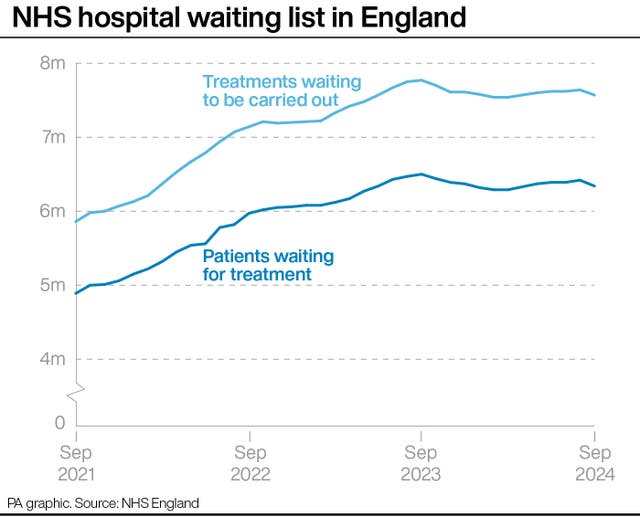Surgeons waiting hours in empty operating theatres due to bed blocks, MPs hear
Lord Darzi gave evidence to the Health and Social Care Committee.

Surgeons are waiting for hours in empty operating theatres due to hospital beds being occupied by patients who could have been discharged, a leading health expert has said.
Lord Darzi, who recently led a hard-hitting review into the state of the NHS for the Government, likened surgical theatres to expensive aeroplanes but warned that they are not being used to their full potential as both patients and surgeons are “all waiting for a bed to become available”.
The surgeon and former minister told MPs that pressure on the NHS will remain unless issues in social care are addressed.
The latest performance data for the NHS in England shows that some 6.34 million patients were waiting for 7.57 million pre-planned hospital appointments at the end of September.
And an average of 12,340 hospital beds per day last month were occupied by people ready to be discharged.
“You can’t admit more patients if you don’t discharge the patients that could be discharged, and if you don’t fix the problem in primary and community settings, you’re always going to have patients lying in beds and others waiting in the A&E department to be admitted into those beds,” Lord Darzi told the Health and Social Care Committee.
“I’ll give you one example of the consequences of that. I’m a surgeon, many of my colleagues were sitting in operating theatres, scrubbed ready at eight o’clock in the morning, waiting till about midday for a patient to come down to the operating theatre.
“Operating theatre is like an airplane – it’s expensive, it has about six or seven people working in it, and it’s vacant.
“It’s vacant because we’re all waiting for a bed to become available to admit a patient for an elective procedure – (the patient has) been fasting since the night before to come in; their relatives have got them into the car and got them to the hospital; they are waiting in a cold waiting room to be dressed up for a bed to be available; to get into the bed; to get the diagnostics and then to be brought up to theatres.
“That has to change.”
Asked about the social care system, he told MPs: “If we don’t address this issue, we’re going to keep the strain on the NHS.
“The problem with that, we’re not getting value for money for every pound we’re spending in the NHS if we haven’t fixed social care.

“The impact is clear and I think it’s something critical needs to be addressed.”
And on productivity drops in the health service, Lord Darzi said: “As you may know, (there has been a) 17% rise in staff in the last three years and the productivity has crashed.”
He continued: “When I was appointed in general cancer surgery, there would have been about five or six of us. That’s doubled now (but) we still have the same number of operating theatres.
“We’re trying also to sweat the asset, but what I said earlier, we’re waiting for three hours in the morning to see whether the patient is admitted. That’s another reason.”
Lord Darzi also highlighted issues with technology, including diagnostic tools, and IT problems which were hampering productivity.
“That’s the reason why our productivity is a significant challenge, and we need to do something about it,” Lord Darzi said.
Lord Darzi’s report, published in September, concluded that the NHS is “in serious trouble” and prompted Labour to promise widespread reform of the health service, with the Government’s 10-year plan for the NHS expected to be published in 2025.
On his report, Lord Darzi told MPs: “The NHS stands at a crossroads, facing unprecedented challenges, but also immense opportunities to rebuild, innovate and thrive.”





